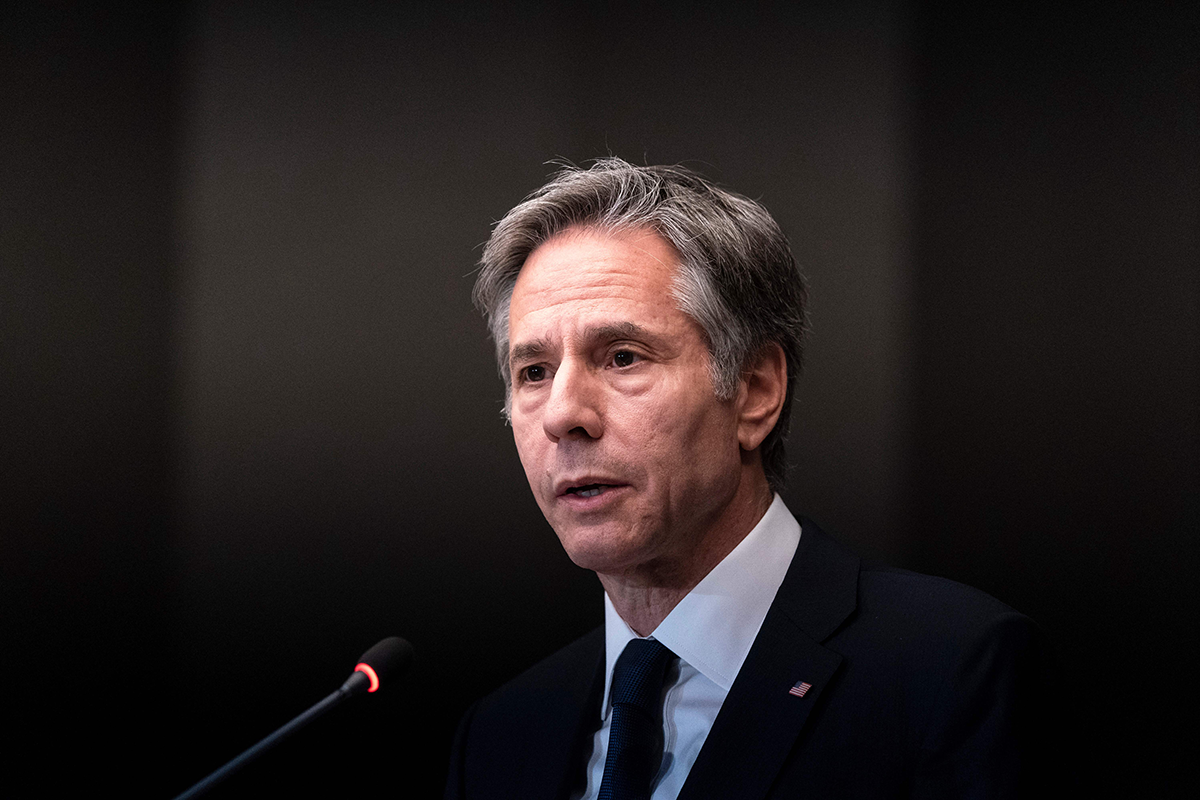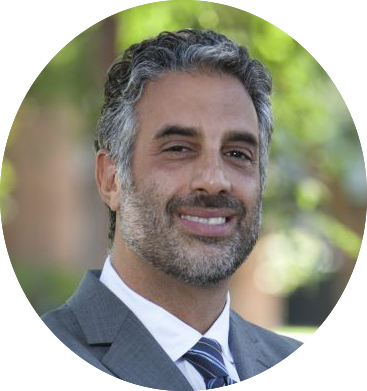

Introduction
The Biden administration has repeatedly said that Israelis and Palestinians “deserve equal measures of security, freedom, opportunity and dignity" (sometimes expressed
Photo by ALEX BRANDON/POOL/AFP via Getty Images
Viewpoints
-
Khaled Elgindy
Khaled Elgindy

A laudable sentiment, but what would it actually entail?
The Biden administration’s “equal measures” formula is striking in two ways. First, it is totally new. While U.S. officials (with the notable exception of the Trump administration) had long talked about ending Israeli occupation, establishing an independent Palestinian state, and even a Palestinian right to self-determination, no previous U.S. administration has couched the conflict as a whole in terms of basic — albeit unspoken — rights. Moreover, the formula is all the more jarring in light of the massive gap that exists between Israelis and Palestinians on all of these. Whereas Israelis on both sides of the 1967 line enjoy relatively high levels of “freedom, security, and prosperity,” Palestinians, particularly the 5.2 million living in the occupied territories, enjoy very little of any of them.
The big question, however, is what does it mean? While the sentiment behind the “equal measures” formula is laudable, the administration has not clarified what it would look like in practice or how it might be achieved. Will Palestinians in the occupied territories, including in the Gaza Strip, have full freedom of movement similar to Israeli settlers? Will Israel provide the 3 million Palestinians in the West Bank and East Jerusalem — who today can access only a fraction of the land, water, and other natural resources available to 700,000 Israeli settlers — a more equitable share of their own resources? Will Palestinians be tried in civilian rather than military courts? Is it even possible to talk about equal measures of freedom when 5 million Palestinians have no legal or political means by which to hold the ruling power accountable — i.e., via the franchise?
It’s not at all clear the administration has thought through what the “equal measures” would actually entail, much less what incentive the current or even a future Israeli government would have to embark on such a radical departure from an otherwise comfortable status quo. All of which raises an even more fundamental question: If it is possible to have “equal measures of security, freedom, and prosperity” in the absence of a two-state solution or a conflict-ending peace deal, what value is there to either of these?
While the Biden administration’s ambitious vision of equality raises many more questions than it answers, it nevertheless provides an opportunity to push for meaningful change by moving away from empty slogans about a nonexistent peace process and an improbable two-state solution to a values-based approach focused on rights and equality. If nothing else, the administration has provided a useful lens by which to measure future initiatives as well as, ironically, its own policies. In doing so, it is already — albeit inadvertently — helping to alter the policy debate on Israel/Palestine.
Khaled Elgindy is a senior fellow at MEI and the director of MEI’s Program on Palestine and Israeli-Palestinian Affairs.
-
David Makovsky
David Makovsky

A one-state solution is unworkable
The quote in question reflects the long-abiding interest of the U.S. to see the conflict between Israel and the Palestinians resolved peacefully, and it reflects the American desire to see a solution that provides dignity for both sides.
It has been this U.S. determination that launched the Madrid process in 1991, hosted the Oslo process on the White House lawn between Yitzhak Rabin and Yasser Arafat in 1993, and on three separate occasions sought to resolve the conflict. The three big efforts were done by Bill Clinton (July 2000 to January 2001), Condoleezza Rice (2007-08), and John Kerry (2013-14). The problem was not a lack of U.S. effort. (On the third round, I was involved in the U.S.-led drive and can attest to Kerry’s intensity of effort.)
It would be a major mistake to interpret the quote in question as stating that the U.S. is leaning in any way toward a one-state approach to delegitimize Israel. Anyone who thinks this should look at President Joe Biden’s comment at the end of the 11-day Gaza crisis. Biden declared, “Until the region says, unequivocally says they acknowledge the right of Israel to exist as an independent Jewish state, there will be no peace.”
The idea of a binational Israeli-Palestinian state will not work in the Middle East. It is a region where there are no democratic traditions; where the post-sectarian age has not arrived; where wars are fought without limits (witness Iraq and Syria); and where there remains no readiness to accept or respect minority rights.
In the Middle East, wherever a central regime is imposed on different sectarian/ethnic groups, the consequence is ongoing struggle. Is the story of Iraq, Syria, Lebanon, and Libya what we should be prescribing for the future of Israelis and Palestinians? The bloodiest wars tend to be civil wars.
Moreover, both Israelis and Palestinians have paid a heavy price to preserve who they are. Israelis have built a state in an environment where they were rejected and wars were forced on them. Does a country that has ingathered Jews from Ethiopia, Syria, Yemen, and throughout discriminated communities in the Middle East, suddenly yield that identity?
Palestinians, too, have persevered. In their dispersal, in the refugee camps and through two intifadas, they have not surrendered their identity. Ahmed Ghneim, a Fatah activist who remains close to Marwan Barghouti, once explained why he favored two states: “In one state, one of us [Israelis or Palestinians] will feel the need to dominate the other.” Ghneim is right.
A binational state would guarantee that the conflict would turn inward. For a country that does not share the same language, religion, or experience, this would turn into a nightmare very quickly.
Yes, the road to two states is arduous, but the road to one state is a path that guarantees endless bloodshed.
David Makovsky is the Ziegler Distinguished Fellow of the Washington Institute for Near East Policy. He served as a senior advisor in the Office of the U.S. Secretary of State where he served as a senior advisor to the Special Envoy for Israeli-Palestinian Negotiations 2013-14.
-
Lucy Kurtzer-Ellenbogen
Lucy Kurtzer-Ellenbogen

An aspirational statement, but also an implicit warning
As a new government takes power in Israel, questions emerge about its collective ability and will to move the needle in a constructive direction on the ongoing occupation and the Israeli-Palestinian conflict. The narrow coalition, spanning a broad political and ideological spectrum, consists of avowed opponents of a Palestinian state — Prime Minister Naftali Bennett among them — alongside staunch advocates for the two-state solution. The governing coalition also assumes its role in a divided society on several fronts following 12 consecutive years with Prime Minister Benjamin Netanyahu at the helm. During that time, Netanyahu has equivocated on willingness to pursue a two-state solution, and pursued policies and emboldened parties that promote settlements on land deemed subject to final status negotiation under the Oslo Accords. Combined with provocations in Jerusalem; ongoing Palestinian division and dysfunction and an emboldened Hamas; pessimistic publics; and the overhang of a failed round of 2013-14 final status negotiations, the path to the Biden administration’s preferred two-state solution is strewn with obstacles.
Against this backdrop, the refrain that Israelis and Palestinians deserve “equal measures of security, freedom, opportunity, and dignity” puts the emphasis on aspirations for the Israeli and Palestinian people, rather than their governments, and serves as a marker in the sand to Israeli and Palestinian leadership of what the administration will not tolerate. It is also a signal of the values underpinning its two-state objective and animating its statements and actions to date, whether on restoring Palestinian aid, reopening a consulate, warning against evictions in East Jerusalem, or insisting on a commitment to Israel’s security.
For those seeking to divine what this means for a policy approach, it is worth noting that this administration entered office with a two-fold goal toward this conflict:
-
Reestablishing positions previously considered fundamental to a sustainable solution, following predecessor policies that President Joe Biden has described as “undercutting” peace;
-
Not being consumed by the conflict or sidetracked from what it deems more pressing priorities.
Therefore, while there are bolder steps the administration could choose to take to promote these values — aimed at stopping creeping annexation, expanding Palestinian Authority (PA) jurisdiction, securing Palestinian governance reform, and preventing and addressing incitement and violence within both societies — in the absence of appetite for such a proactive approach, the administration is minimally signaling there are actions for which the parties may expect a strong reaction. This is neither a detailed policy nor a roadmap for final status conflict resolution. However, with a new Israeli government intent on holding together across deep divisions and ensuring a strong bipartisan relationship with the U.S., and PA leadership eager to restore relations with the U.S. after the disintegration of the past four years, the implicit warning and stated aspiration may work to minimally check bad behaviors, if not prompt forward-leaning gestures by the parties that are sympathetic with these broadly-stated U.S. goals.
Lucy Kurtzer-Ellenbogen is the director of the Israeli-Palestinian conflict program at the U.S. Institute of Peace and frequently presents and publishes in a variety of academic, policy, and media forums on policy and civil society efforts related to the conflict.
-
-
Omar Dajani
Omar Dajani

If Blinken intends to speak powerfully, he should speak plainly
Secretary of State Antony Blinken’s affirmation that Israelis and Palestinians "deserve equal measures of security, freedom, opportunity, and dignity" marks a welcome change from the “white supremacist mindset” of the Trump administration. But it exemplifies two features of American Israel-Palestine policymaking that have delivered little more to Palestinians than a thoroughly unequal measure of suffering.
First, the secretary’s careful formulation is as striking for what it doesn’t say as for what it does. Like President George W. Bush’s call for an end “to the Israeli occupation that began in 1967” (an attempt to avoid acknowledging that what Israel occupies is Palestinian territory), Blinken’s phrasing leaves one wondering about the tortured deliberations that produced it. Why not simply call for equality? Why say nothing about equal political rights — such as the right to self-determination (which Israel’s Nation-State Law explicitly confines to Jews) or the right to vote for the government that governs one’s life (which is currently denied to more than 4 million Palestinians)? If the secretary wanted to avoid appearing to endorse a one-state solution, he could have said so (“equal rights for Arab and Jew, whether they live in one state or two!”). The use of the word “deserves” is also telling. Saying that Palestinians deserve a better life reveals nothing about what — and who — stands in their way. If Blinken intends to speak powerfully, he should speak plainly, especially if all he plans to do is talk.
That brings me to my second point: While the secretary’s statement conveys a worthy (if vague) aspiration, it offers no theory of change. Perhaps taking a cue from the Center for a New American Security report that appears to have inspired the “equal measures” language, the Biden administration seems to have limited its ambitions for Israel-Palestine to not making matters worse. To be sure, the administration’s pessimism about the appetite of Israeli leaders — and voters — for far-reaching change is warranted. One of the most startling findings in a recent RAND study of public attitudes toward peacemaking in Israel-Palestine is that more Israeli Jews prefer the status quo to any alternative future for their country — and that is true even among respondents who professed support for a two-state solution in principle. Apparently neither achieving peace nor transforming the lives of Palestinians was seen to be worth risking the prosperity and security Israelis currently enjoy. The question, then, is this: If one rules out the Boycott, Divestment, and Sanctions (BDS) movement, as Joe Biden has, what will move Israelis sufficiently to cause them to support the far-reaching structural change Palestinians “deserve”?
Omar Dajani is a professor at the University of the Pacific’s McGeorge School of Law and co-director of its Global Center for Business & Development. He is recognized as a leading expert on legal aspects of the Palestinian-Israeli conflict.
-
Michele Dunne
Michele Dunne

Some change, but not a great deal
The new and oft-repeated formulation of “equal measures of security, freedom, opportunity, and dignity” for Israelis and Palestinians is meant to signal some change in policy, but not a great deal of change. The phrase is taken directly from a December 2020 policy report by Brookings and the Center for a New American Security, written by authors close to the Biden administration.
The most important word is “equal,” which is meant to signal to progressives within Democratic Party circles — and to Israel — that the administration is aware of and concerned about the glaring inequality that Palestinians experience under occupation. And it implies that President Joe Biden, unlike Donald Trump, would not promote or endorse solutions under which Israel formally annexes territory but Palestinians continue to live under a separate and unequal legal regime.
But there are also aspects to the new formulation that fall well short of where Democratic progressives (as well as Palestinians) would like U.S. policy to go. Somehow, “equal measures” seems to be ducking the question of equal rights, which would be a stronger formulation. And while “security, freedom, opportunity, and dignity” seems to be a fulsome list, at least one critical word is missing: citizenship. Is the U.S. administration saying that whatever the ultimate political arrangement — two states, confederation, one state — Washington will only support a solution under which Palestinians and Israelis enjoy equal rights under the law as full citizens? The new formulation, while edging in that direction, does not go quite that far.
Michele Dunne is the director and a senior fellow in the Carnegie Endowment for International Peace's Middle East Program, where her research focuses on political and economic change in Arab countries, particularly Egypt, as well as U.S. policy in the Middle East.
-
Daniel Kurtzer
Daniel Kurtzer

Determined U.S. diplomacy and the path forward
The Biden administration is right: Palestinians and Israelis deserve equal measures of freedom, security, dignity, and prosperity. They both deserve to exercise the right of self-determination, including the right to live in independent states in the homeland they share. As challenging as it has been and will be to partition the land into two states, there simply is no alternative that will prove acceptable to both peoples. Neither a one-state solution nor an upfront confederation will be acceptable to both peoples. Thus, the administration must remain committed to a two-state outcome, even if it is not achievable in the near term.
In the period ahead, the administration can advance policies that help assure Palestinians the human rights and freedoms they deserve, and assure both sides the security they need. This means expecting Israel to start rolling back key elements of the occupation: stopping creeping annexation by curbing settlement expansion; removing impediments to Palestinian economic development; removing impediments to Palestinian movement throughout the West Bank; restoring the status quo on the Haram al-Sharif/Temple Mount and curbing excessive Israeli police actions there and elsewhere; and halting home evictions and demolitions. It means developing modes of behavior and interaction in Jerusalem that will make possible two capitals for the two states in a city that is not divided by walls and barriers. And it means expecting Palestinians, in both the West Bank and Gaza, to abjure violence against Israel.
To be sure, determined leadership in Israel and in Palestine will be required to set all of this in motion. The United States must be ready to act with an energetic, sustained diplomatic strategy and engagement, in coordination with Arab states and others in the international community, to energize the process and keep it focused.
The ultimate goal of two independent states can be advanced as the atmosphere and life on the ground improve, and as trust is restored. Freedom, security, dignity, and prosperity are necessary outcomes, as well as a pathway to the ultimate resolution of the underlying conflict.
Daniel Kurtzer, a former U.S. Ambassador to Egypt and Israel, is the S. Daniel Abraham Professor of Middle East policy studies at Princeton University’s School of Public and International Affairs.
-
Dennis Ross
Dennis Ross

The Biden administration’s formula suggests an aspiration and a direction
The Biden administration has been using a formula to talk about what should exist between Israelis and Palestinians. Here are two peoples in the words of Secretary of State Antony Blinken who should have “equal measures of security, free, peace, dignity.” The formula is one that is aspirational because clearly we are far from it today. Certainly, it fits with the objective of producing two states for two peoples, reflecting a conflict that has been about two peoples and two national movements competing for the same space.
Of course, some may embrace this statement as suggesting a one-state outcome in which both peoples enjoy fundamental equality. That objective might work in a laboratory but is an illusion in the Middle East. We are clearly not in a post-nationalism phase in the Middle East (or for that matter internationally) and as we survey the region, the one thing we see is that states that have more than one identity, national, sectarian or tribal, are either in perpetual conflict, failing or paralyzed. That is not the future we should seek for Israelis and Palestinians.
Not surprisingly, the Biden administration is committed to a two-state solution, and the formula is designed, at least in part, to suggest an aspiration and a direction. It is also a response to the perception of the Trump administration approach that seemed to focus on Israeli but not Palestinian needs. In that sense, the formula has been offered to project an image of balance.
For the purposes of this discussion, we have been asked to discuss the implications of the formula for the humanitarian situation in Gaza, pending expulsions, and Israeli settlement activities. I find the discussion on Gaza often ahistorical so a reminder of a few facts is useful. Israel withdrew entirely from Gaza — soldiers and settlers — in 2005. For those who say yes, but they imposed a quarantine on what could go into Gaza, they did not do so until 2007, after the Hamas coup. Hamas never ceased trying to attack Israel after the withdrawal, even carrying out attacks against the crossing points from Israel into Gaza as if they were a favor to Israel. It led the Israelis to reduce the number of crossing points to two, making life more difficult for Gazans, but the well-being of Gazans has rarely been the concern of Hamas.
Consider that after the 2014 conflict between Israel and Hamas that went on for 51 days, Hamas had roughly 3,300 rockets left. The Israelis had destroyed 32 tunnels, of which 14 penetrated Israel. Fast forward to 2021: Hamas had roughly 30,000 rockets, and Israel destroyed about 60 miles of tunnels — which Yahya Sinwar, the Hamas leader in Gaza, said constituted only 5% of the tunnels. Even if an exaggeration, let’s say Israel destroyed half of the tunnel network — a network that is designed not to protect the people of Gaza, but to safeguard the Hamas leaders, fighters, and weapons. Huge amounts of concrete, steel, electrical wiring, and wood went into that underground construction carried out by Hamas — all of which was desperately needed above ground for the development of Gaza.
I am for massive reconstruction of Gaza, not just humanitarian subsistence, and I would like to see the U.S. mobilize the international community to lead the effort. But no one is going to invest in such an effort knowing that Hamas will divert much of this material for its purpose of rearming and rebuilding its underground infrastructure — and also knowing that at a time when Hamas feels it can gain politically in its competition with the Palestinian Authority, it will launch rockets at Israel again, leading to Israeli responses that destroy the investment. So for the sake of the Palestinians in Gaza there needs to be a credible mechanism that can assure reconstruction for no rearmament — and that appears to be the Biden administration approach.
As for the issues of expulsions in Sheikh Jarrah and Israeli settlement activity, two brief comments. First, the Netanyahu government wanted to approach the issue as if it were a narrow legal one. When it comes to Jerusalem, everything is sensitive — and especially when it comes to evictions and displacement. Being right in a narrow technical sense is less important than being wise. And, here again the Biden administration — perhaps guided by its formula of equality — has correctly urged a policy of being wise on the Israeli government.
Second, settlement policy should be guided by what preserves a two-state outcome and what puts it at risk. Before we went to Camp David in 2000, we established the concept of settlement blocs and territorial swaps — meaning that Israel would absorb roughly 5% of the territory closest to the June 4, 1967 lines where about 80% of the settlers reside, and the Palestine state would receive territory from Israel as compensation. Building within the bloc areas is consistent with the two-state outcome; building outside is not. Preserving the former is the only way to fulfill the Biden formula.
Ambassador Dennis Ross is counselor and William Davidson Distinguished Fellow at The Washington Institute for Near East Policy.
-
Zaha Hassan
Zaha Hassan

Will Gaza have equal measures of freedom, prosperity, and democracy?
While there is a pressing need for immediate humanitarian relief and reconstruction support in Gaza following last month’s intense violence between Israel and Hamas, Palestinians in the Strip will need far more than that to achieve real long-term stability. They need jobs, a functioning economy, and proper access to essential services like sanitation and water. Most of all, however, they need, as U.S. President Joe Biden put it, “equal measures of freedom, prosperity, and democracy.”
Since Hamas took control of Gaza in 2007, Israel has enforced a separation policy, cutting it off from the West Bank — and the rest of the world. This blockade limits the freedom of movement of people, goods, and resources, resulting in an ever-worsening public health catastrophe. These dire conditions are the underlying cause of the recurring violence between Hamas and Israel. Hamas uses violence as a tool to force Israel to ease restrictions, while Israel responds with disproportionate force to diminish Hamas’s military capabilities or weaken its support. To break this vicious cycle, the Biden administration must work alongside Israel to end the blockade, encourage free movement in and out of Gaza, and allow Palestinians to carry out normal economic activity.
The current situation is further exacerbated by the political divide between Fatah and Hamas. By barring support for a Palestinian Authority (PA) government that includes or is unduly influenced by Hamas, U.S. policy makes national reconciliation even more difficult to achieve. Reconstruction assistance provides an opportunity to change this, however. Working in conjunction with the U.N., the EU, the Munich Group, and Qatar, the U.S. could leverage assistance to support Fatah-Hamas reconciliation, Palestinian elections, and Hamas’s inclusion under the Palestine Liberation Organization (PLO) umbrella.
In place since 2007, the U.S. and EU no-contact policy regarding Hamas has failed to achieve its aims and has only resulted in greater misery for the people of Gaza. The Middle East Quartet has long insisted that Hamas meet three criteria — recognize Israel, renounce violence, and accept signed agreements with Israel — before any assistance can be given to a PA government in which it plays a part. This policy has failed to achieve its aims and a new approach is needed. The Biden administration should call on Hamas to formally accept international law and PLO principles as the basis for future dialogue and engagement. The Quartet principles should then become a measure of Israel’s compliance with signed agreements with the PLO and its obligations as an occupying power. Such an approach would be more likely to moderate Hamas, end the violence crippling Gaza, and give Palestinians a sense of security.
For too long, the U.S. and international donors have focused on the aftermath of Israeli-Hamas violence, rather than the problem itself: the blockade. As Gaza prepares to rebuild once more, now is the time for the U.S. to review its policy and reassess how it could be better used to prevent future violence and promote rights and human security. Palestinians in Gaza cannot wait any longer to secure their rights.
If the U.S. really wants Palestinians to have the political and economic rights and freedoms Israelis enjoy it must prioritize ending the Israeli blockade and restrictions on Gaza. The status quo blocks Palestinian reconciliation, guarantees recurring violence, and condemns Palestinians to inhumane conditions. It also indefinitely thwarts a comprehensive peace agreement between Israel and the PLO — a U.S. policy objective — buying Israel the time and political space to cement its sovereignty over the West Bank. This will neither bring peace and stability to Israel-Palestine, nor “freedom, democracy, or prosperity” for Palestinians and Israelis.
Zaha Hassan is a human rights lawyer and visiting fellow at the Carnegie Endowment for International Peace. This piece was adapted from a longer article published by the Carnegie Endowment for International Peace.











